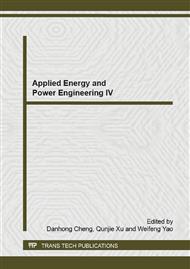p.1361
p.1366
p.1371
p.1378
p.1384
p.1391
p.1398
p.1405
p.1409
Multi-Objective Dispatch of a Microgrid with Battery Energy Storage System Based on Model Predictive Control
Abstract:
Microgrid has been considered as a new green and reliable power system technique, especially for remote regions. In recent years, there is a steady increasing in studying optimal microgrid deploying and operation strategies. Multi-objective optimization is the most interesting approach for resolving these issues. The multi-objective optimization includes energy operation cost and emission pollutant cost. Potential benefits of using model predictive control (MPC) strategy for multi-objective dispatch problem in microgrid with fluctuant energy resources, such as solar, wind and alike are also presented by comparing with the strategy of day-ahead programming strategy and normal strategy with no battery energy storage. Simulation results show that the proposed model in this paper could reflect the actual characteristics of microgrid more precisely.
Info:
Periodical:
Pages:
1384-1390
Citation:
Online since:
December 2014
Authors:
Price:
Сopyright:
© 2015 Trans Tech Publications Ltd. All Rights Reserved
Share:
Citation:


